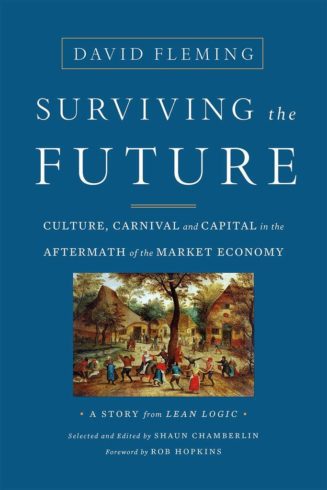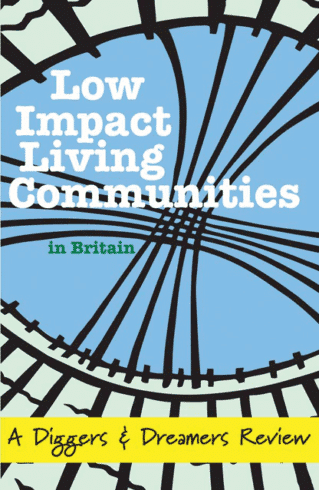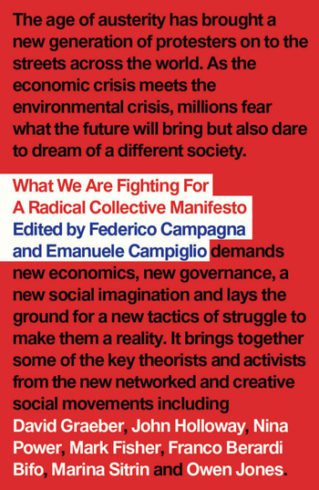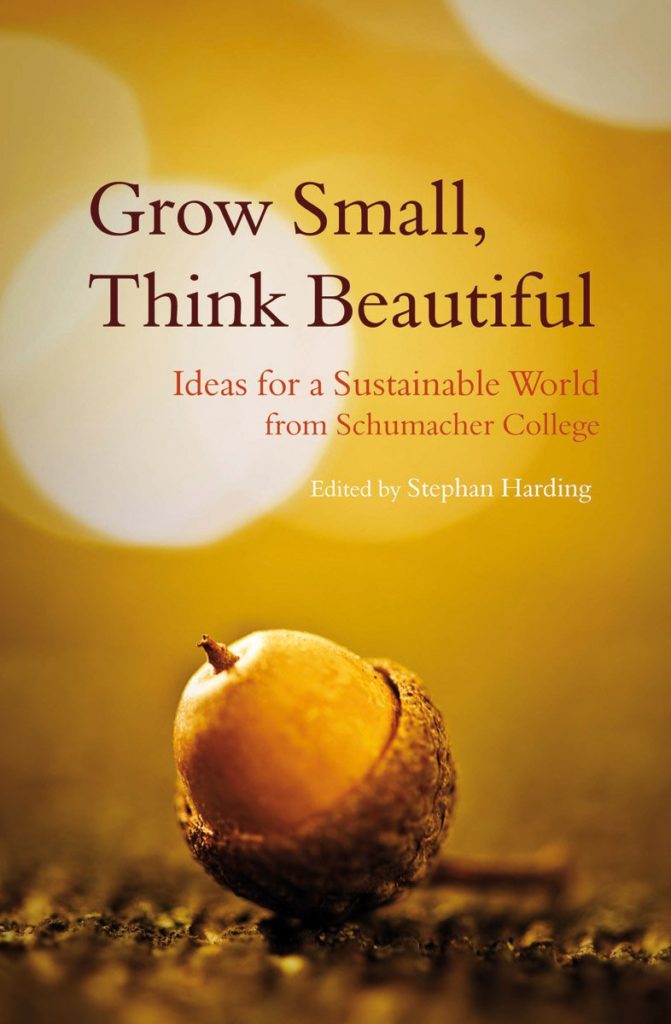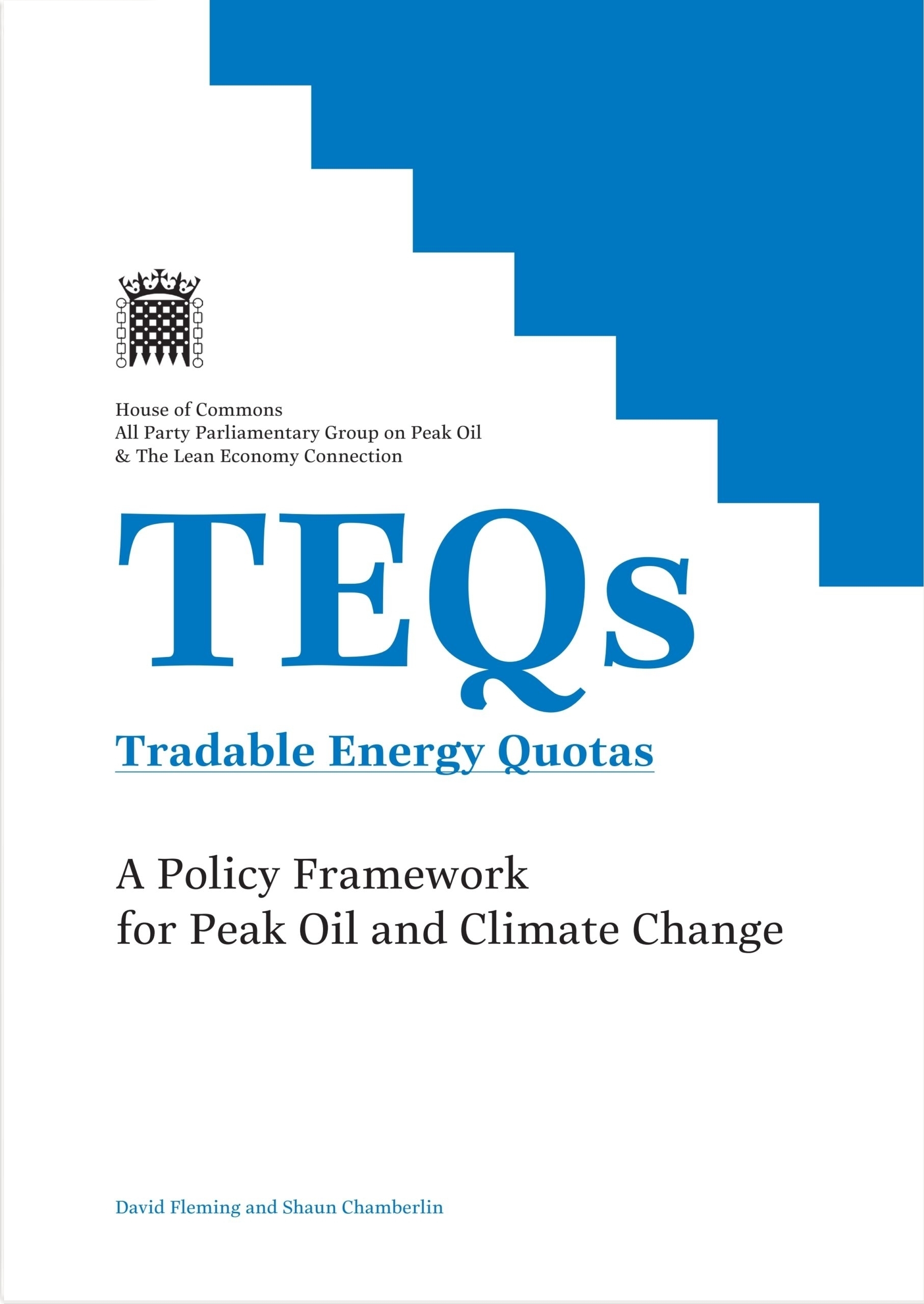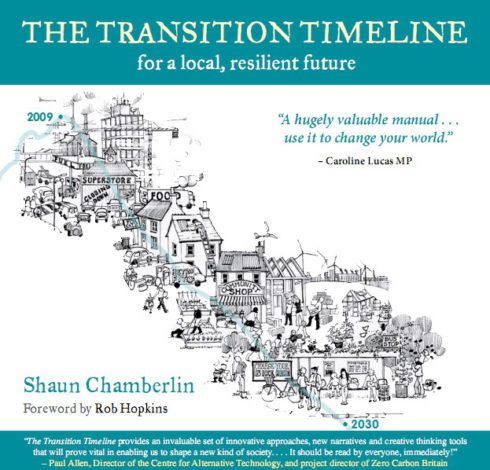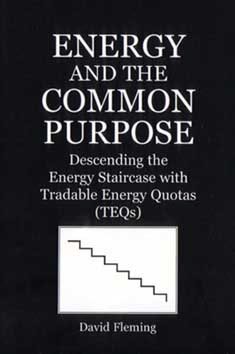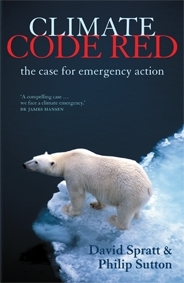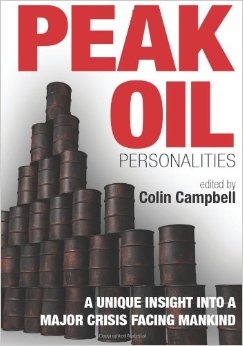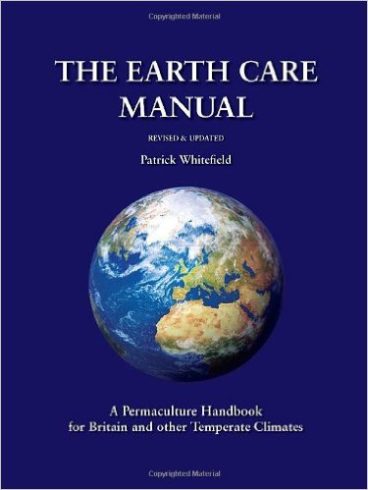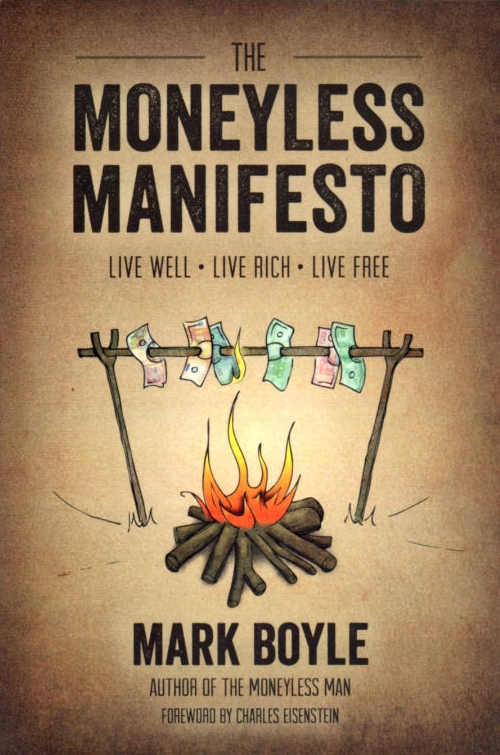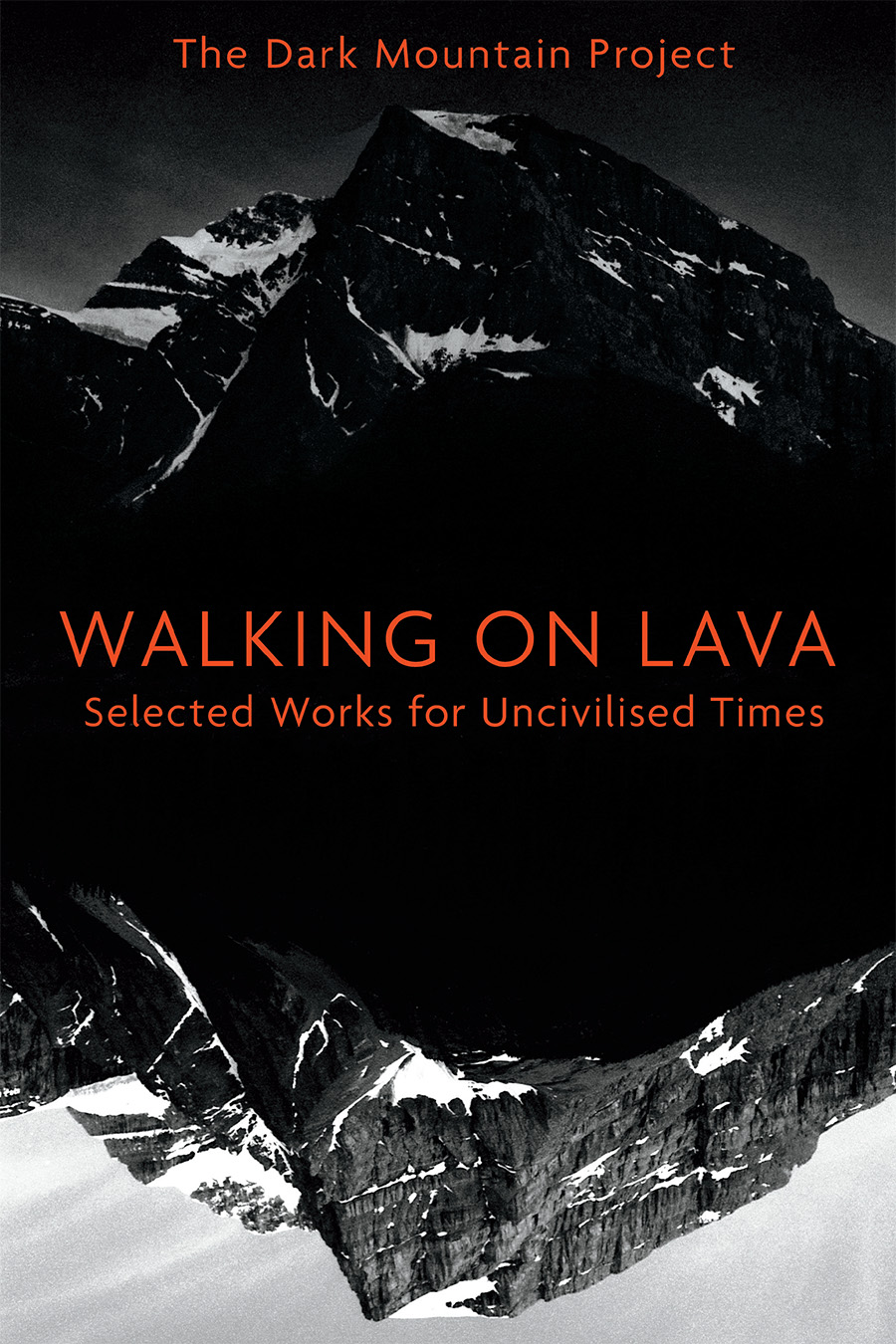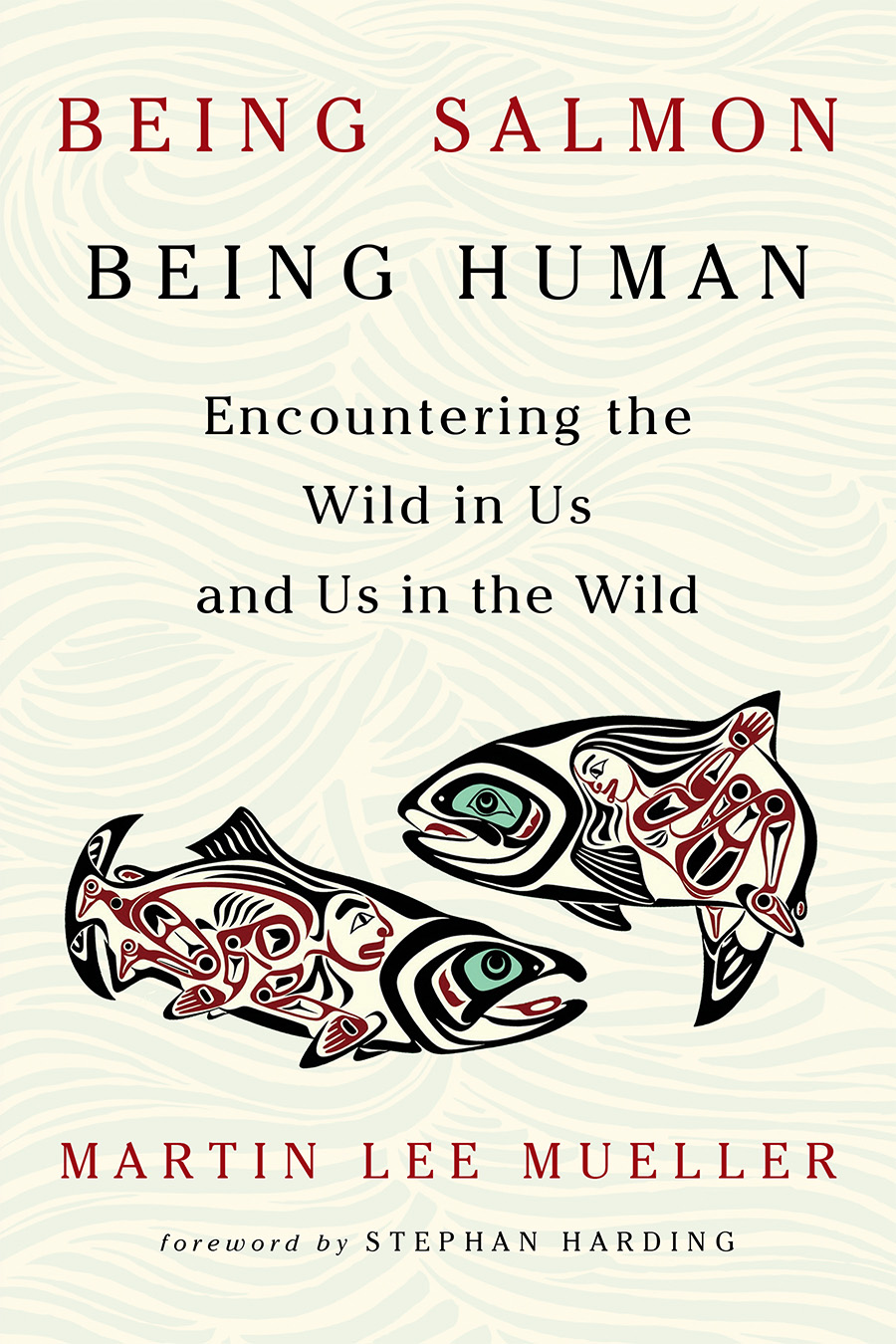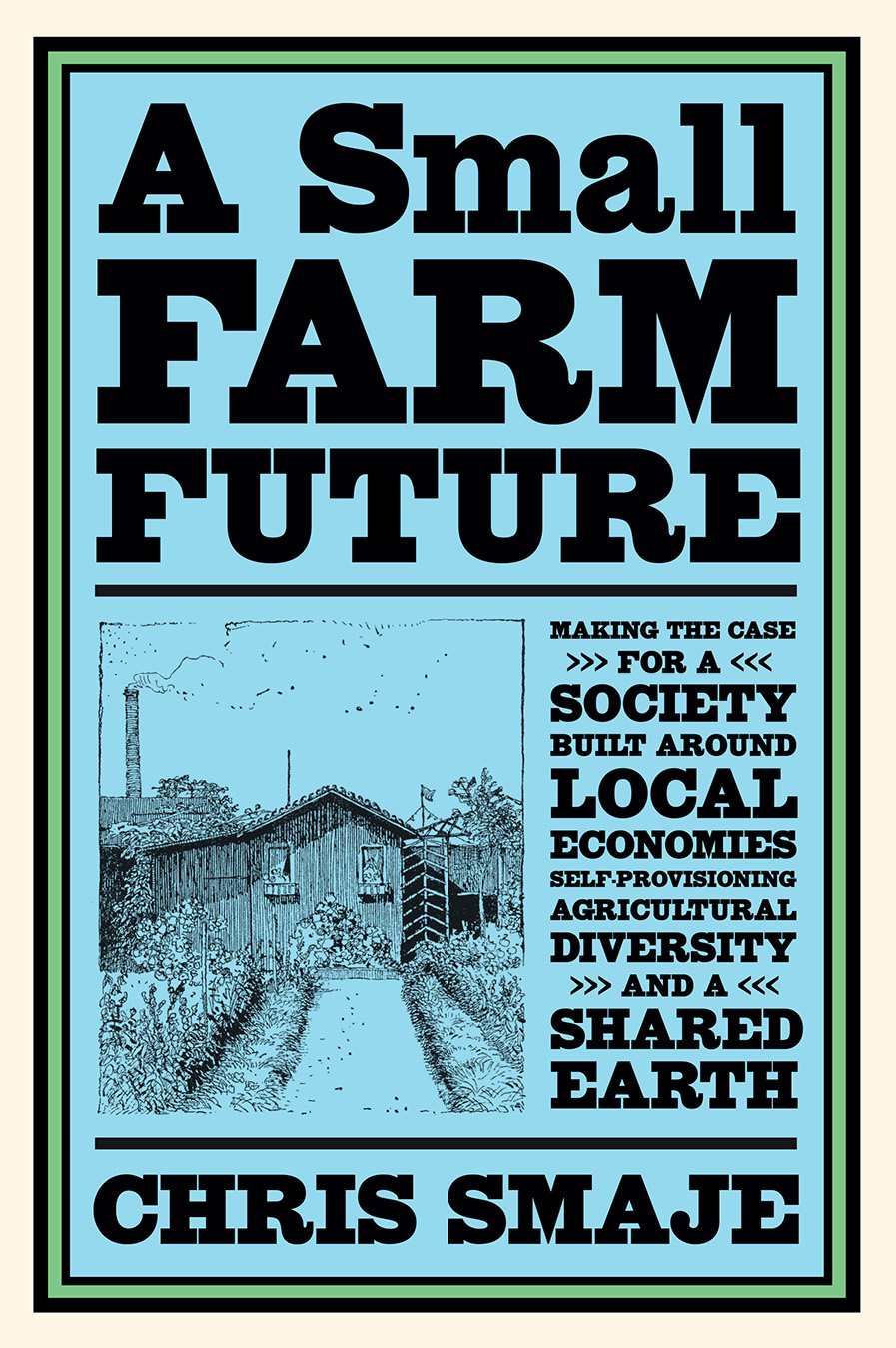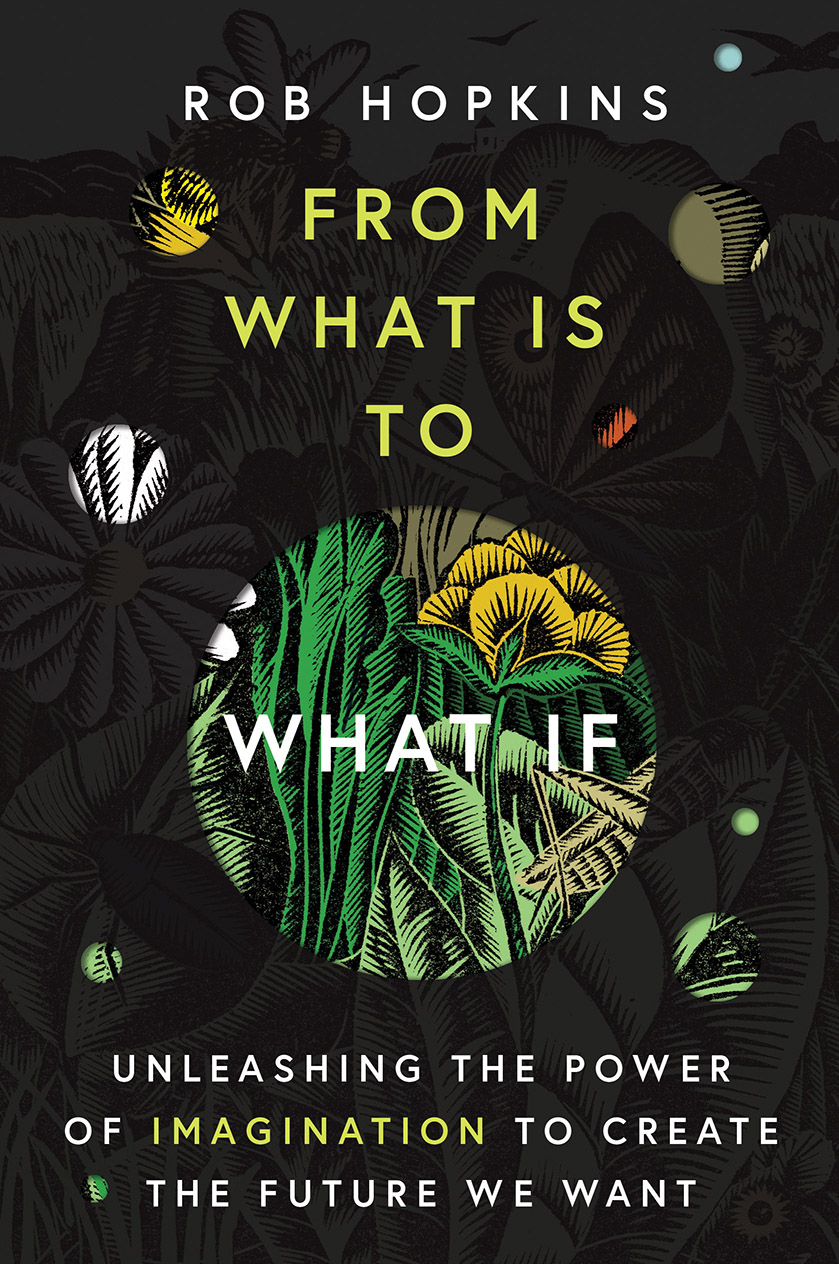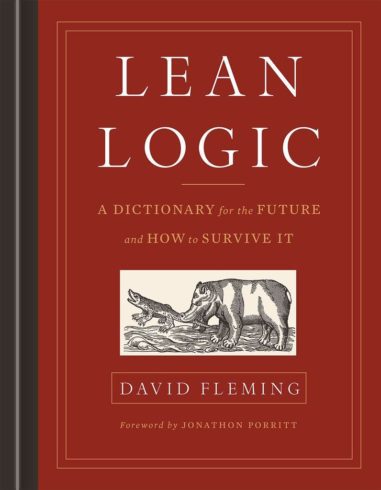BOOKS
“A conventional good read is usually a bad read, a relaxing bath in what we know already. A true good read is surely an act of innovative creation in which we, the readers, become conspirators.”
– Augustine Birrell
288 page paperback, 6 x 9 inches
Published in 2016 by Chelsea Green Publishing
Also now available as eBook, or audiobook narrated by Shaun
Surviving the Future: Culture, Carnival and Capital in the Aftermath of the Market Economy
by Dr. David Fleming
Conceived and created by Shaun Chamberlin
Foreword by Rob Hopkins
Surviving the Future is a story drawn from the fertile ground of the late David Fleming’s extraordinary Lean Logic: A Dictionary for the Future and How to Survive It. That hardback consists of four hundred and four interlinked dictionary entries, inviting readers to choose their own path through its radical vision.
Recognizing that Lean Logic’s sheer size and unusual structure can be daunting, Fleming’s long-time collaborator Shaun Chamberlin has selected and edited one of these potential narratives to create Surviving the Future. The content, rare insights, and uniquely enjoyably writing style remain Fleming’s, but are presented here at a more accessible paperback-length and in conventional read-it-front-to-back format.
The subtitle — Culture, Carnival and Capital in the Aftermath of the Market Economy — hints at Fleming’s vision. He believed that the market economy will not survive its inherent flaws beyond the early decades of this century, and that its failure will bring great challenges, but he did not dwell on this: “We know what we need to do. We need to build the sequel, to draw on inspiration which has lain dormant, like the seed beneath the snow.”
Surviving the Future lays out a compelling and powerfully different new economics for a post-growth world. One that relies not on taut competitiveness and eternally increasing productivity — “putting the grim into reality” — but on the play, humor, conversation, and reciprocal obligations of a rich culture. Building on a remarkable breadth of intellectual and cultural heritage — from Keynes to Kumar, Homer to Huxley, Mumford to MacIntyre, Scruton to Shiva, Shakespeare to Schumacher — Fleming describes a world in which, as he says, “there will be time for music.”
This is the world that many of us want to live in, yet we are told it is idealistic and unrealistic. With an evident mastery of both economic theory and historical precedent, Fleming shows that it is not only desirable, but actually the only system with a realistic claim to longevity. With friendliness, humor, and charm, Surviving the Future plucks this vision out of our daydreams and shows us how to make it real.
reviews
(for a nicely-presented selection from the exceptional published reviews, click here)
“I would unreservedly go so far as to say that David Fleming was one of the most original, brilliant, urgently-needed, under-rated, and ahead-of-his-time thinkers of the last 50 years. History will come to place him alongside Schumacher, Berry, Seymour, Cobbett, and those other brilliant souls who could not just imagine a more resilient world but who could paint a picture of it in such vivid colours. Step into the world of David Fleming; you’ll be so glad you did.”
~ Rob Hopkins, co-founder of The Transition Network
“Each time I encountered David Fleming, he left behind something whose value I was a little too slow to recognise. A sketch for Tradable Energy Quotas. A critique of the nuclear fuel cycle. And clearest in my memory: a slim working paper entitled ‘The Lean Economy’. It took me nearly a decade to respond properly to its call. In Surviving the Future, Fleming has left behind his greatest gift: a remarkable clarity of vision — a way of seeing the world not just for what it is, but for what it might be. Hopefully, this time I’m ready for it.”
~ Tim Jackson, Professor of Sustainable Development, University of Surrey; author of Prosperity without Growth
“David Fleming was an iconoclast in a time when orthodox thinking reasserted suffocating control. When many major environmental voices had, in effect, decided to ‘go with the flow’, accept the mainstream economy, and do their best to make it greener, David Fleming went the other way. His analysis told him that nothing short of a paradigm shift could ensure our collective survival, and he said so, loudly, without fear of being marginalised. His courage in saying unpopular things is clear in these writings, and we should all thank him. Without the uncompromising clarity of David’s writing, we would delude ourselves as to the scale and the immediacy with which we must reshape the economy and our lifestyles. Thank goodness his analysis can now be shared more widely.”
~ Andrew Simms, co-director, New Weather Institute; fellow, New Economics Foundation; author of Cancel the Apocalypse
“David Fleming was an elder of the UK green movement and a key figure in the early Green Party. Drawing on the heritage of Schumacher’s Small Is Beautiful, Fleming’s beautifully written and nourishing vision of a post-growth economics grounded in human-scale culture and community — rather than big finance — is both inspiring and ever more topical.”
~ Caroline Lucas MP, former leader, Green Party of England and Wales; former Member of the European Parliament
“David Fleming predicts environmental catastrophe but also proposes a solution that stems from the real motives of people and not from some comprehensive political agenda. He writes lucidly and eloquently of the moral and spiritual qualities on which we might draw in our ‘descent’ to a Lean Economy. His highly poetic description of these qualities is neither gloomy nor self-deceived but tranquil and inspiring. All environmental activists should read him and learn to think in his cultivated and nuanced way.”
~ Roger Scruton, writer and philosopher; author of over thirty books, including Green Philosophy
“Why do some of the truly great books only emerge and exact their influence upon us after the death of their authors? Perhaps it takes a lifetime to accrue and refine the necessary wisdom. Or perhaps it simply takes the rest of us too long to catch up. Like Thoreau, Fleming’s masterpiece brims not only with fresh insight into every nook and cranny of our culture and what it means to be human, but with such wit and humour that its challenging ideas and radical perspectives become a refreshing delight. If we’re to have a future worth surviving, this book demands to be read, re-read, and — ultimately — acted upon.“
~ Mark Boyle, author of The Moneyless Manifesto and Drinking Molotov Cocktails with Gandhi
“Shaun Chamberlin has edited Fleming’s Lean Logic to a string of gems that refract the burning issues of our times.“
~ Professor Alastair McIntosh, author of Soil and Soul and Poacher’s Pilgrimage
“‘The end is nigh’ messages are a dime a dozen these days. Fleming’s work doesn’t shy away from that, but it’s his vision of what could come next — and the potential richness, carnival, and culture of it — that I think is so rare and precious in these books. Less what we stand to lose and more what we’ve lost already and stand to regain if we do things right.“
~ Jeremy Leggett, founder, Solarcentury and SolarAid; author of The Winning of the Carbon War
“I can’t say enough good things about this book. David Fleming’s keen interdisciplinary mind was at home in economics, history, and anthropology, so when he imagines the world beyond fossil fuels, the result is not just a schematic diagram but narrative with bone, sinew, flesh, and blood. This is how real human beings could and hopefully will respond to climate change and resource depletion.”
~ Richard Heinberg, Senior Fellow of The Post Carbon Institute, and author of twelve books, including The Party’s Over: Oil, War & the Fate of Industrial Societies and Afterburn: Society Beyond Fossil Fuels
“David Fleming has laid out a logical, persuasive, and very readable pathway to dealing with the most crucial catastrophe we face: the double bind of growth — if no growth the economy fails, if growth the economy fails. He illuminates the ‘transition from the global city’ to ‘habitats on a human scale’ and an economy ‘organized around the rediscovery of community.’ If there will be any survival following the coming collapse, it will be through following the wisdom provided here.”
~ Kirkpatrick Sale, author of Human Scale
152 pages, 216 x 140mm
Published in 2014 by Diggers & Dreamers Publications
Low Impact Living Communities, in Britain
Edited by Sarah Bunker, Chris Coates, James Dennis and Jonathan How
Authors: Shaun Chamberlin, Simon Fairlie, Dave Darby, Chris Coates, Liz Lainé, Paul Wimbush, Tony Wrench, Jenny Pickerill, Dennis Hardy, Charlotte Oliver…
Human impact on the Earth has to be reduced but how far are you prepared to go? Could you live a really low impact lifestyle? Would it be easier if you were within some type of low impact living community?
In this book you can read about the ground-breaking inventiveness and ingenuity of such groups. There are lessons here for everybody who wants to carry on enjoying life on this lovely planet.
224 pages, 198 x 129mm
Published in 2012 by Pluto Press
What We Are Fighting For: A Radical Collective Manifesto
Edited by Federico Campagna and Emanuele Campiglio
Authors: Shaun Chamberlin, David Graeber, John Holloway, Owen Jones, Ann Pettifor, Hilary Wainwright, Alberto Toscano, Nina Power, Mark Fisher, Franco Berardi Bifo, Marina Sitrin…
The age of austerity has brought a new generation of protesters on to the streets across the world. As the economic crisis meets the environmental crisis, millions fear what the future will bring but also dare to dream of a different society.
What We Are Fighting For tries to answer the question that the mainstream media loves to ask the protesters. The first radical, collective manifesto of the new decade, it brings together some of the key theorists and activists from the new networked and creative social movements.
Chapters outline the alternative vision that animates the new global movement — from ‘new economics’ and ‘new governance’ to ‘new public’ and ‘new social imagination’. The book concludes by exploring ‘new tactics of struggle’.
reviews
“This collection provides a rallying point for all those who resist the dogmas of contemporary politics and seek a fresh set of alternatives. What We Are Fighting For is a manifesto full of urgent, articulate responses to the current situation.”
~ Simon Critchley, Hans Jonas Professor of Philosophy at the New School, New York, and author of The Faith of the Faithless.
—
“Here are the first flowers of spring: the beginning of an epochal dialogue about the human future. Inspired by the Occupy movements across the world, What We Are Fighting For should inspire all of us to join the conversation.”
~ Mike Davis, author of Planet of Slums and City of Quartz
280 pages, 234 x 156mm
Published in 2011 by Floris Books
Grow Small, Think Beautiful: Ideas for a Sustainable World from Schumacher College
Edited by Dr. Stephan Harding
Authors: Shaun Chamberlin, James Lovelock, Fritjof Capra, Helena Norberg-Hodge, Rupert Sheldrake, Satish Kumar, Colin Tudge, Jules Cashford, Peter Reason, Craig Holdredge…
Schumacher College, based near Totnes in Devon, England, opened its doors in the early 1990s and is now an internationally-renowned centre for transformative learning on all aspects of sustainable living.
James Lovelock led the first course on Gaia theory. A host of visionary thinkers has followed, including mathematician and biologist Brian Goodwin, who died in 2009. This book is a realisation of his vision for Schumacher College to publish a collection of essays on sustainable solutions to the current global crisis. Themes include the importance of education, science, Transition thinking, economics, energy sources, business and design, in the context of philosophy, spirituality and mythology.
This book is essential reading for anyone concerned about the future of our society and the environment.
reviews
“Grow Small, Think Beautiful is a poignant read which leaves one with a lingering sense of hope … we are gently guided to share [the authors’] sense of awe at the omnipresent natural harmony evident at the heart of the world’s eco-systems … The cumulative effect of this collection of heartfelt essays is that the reader is motivated actively to involve himself as part of the solution, not only mentally and physically but ultimately spiritually.”
~ The Temenos Academy Review.
—
“All [the authors] are considered among the most innovative thinkers in their respective fields of enquiry … [and] surprised me, in their ability to fit such profound thoughts in so few pages, and to inspire me and spark off new and fresh ideas.
I loved reading this book, and it is one that I will certainly be returning to further … This book is absolutely jam packed with ideas and solutions, covering education, the environment, systems thinking and complexity, design, visioning and story-telling, transition and Transition Towns, agriculture, economics, business organisation, and deep ecology.”
~ Simon Robinson, editor of the Transition Consciousness blog, and co-author of Holonomics: Business Where People and Planet Matter.
56 pages, 240 x 170mm
Published in 2011 by The Fleming Policy Centre
Order Directly from Dark Optimism
Tradable Energy Quotas: A Policy Framework for Peak Oil and Climate Change
The All Party Parliamentary Group on Peak Oil
by David Fleming and Shaun Chamberlin
View as a free pdf (also available in Italian or Spanish) or order a hard copy below
endorsements

We urgently need to have a system in place to mitigate the economic and social consequences of peak oil. I believe TEQs provide the fairest and most productive way to deal with the oil crisis and to simultaneously guarantee reductions in fossil fuel use to meet climate change targets.
John Hemming MP, Chairman, All Party Parliamentary Group on Peak Oil
(also see John Hemming’s video comments on TEQs here or below)

TEQs have long been Green Party policy, as we believe that we need a fair and transparent system to reduce energy demand and give each person a direct connection to the carbon emissions associated with their lifestyle. The TEQs scheme would guarantee that the UK’s targeted carbon reductions are actually achieved, while ensuring fair shares of available energy.
Caroline Lucas, Leader of the Green Party, and MP for Brighton Pavilion
(also see Caroline Lucas’ video comments on TEQs here or below)

Whilst I am less convinced than some people about the imminence of peak oil I firmly believe, regardless of this, that tradable personal carbon allowances could make a big contribution to reducing energy consumption and therefore carbon emissions in Britain. I also believe that it is extremely urgent for Britain, and all developed countries, to move away from a fossil fuel-based economy as quickly as possible.
Tim Yeo MP, Chairman, House of Commons Energy and Climate Change Select Committee

Rationing is the fairest and most effective way of meeting Britain’s legally binding targets for cutting greenhouse gas emissions.
Lord Smith of Finsbury, Chairman, Environment Agency

A concept of brilliant simplicity, offering a predictable and orderly reduction of greenhouse gas emissions year-on-year, with flexibility in an enclosed system, independent of taxation and providing complete transparency between goals and delivery.
Colin Challen, Founder Chairman, All Party Parliamentary Group on Climate Change

What I like about TEQs is the fairness of it. When the energy crunch hits us, it will behove government and industry to ensure equitable access to available energy, within a national budget. TEQs is a route to synergisitic efforts of the kind we will need if we are to mobilise the infrastructure of a zero-carbon future fast, under pressure. It would increase the chances of working our way through the grim times to renaissance-through-resilience.
Jeremy Leggett, author, and convenor of the UK Industry Taskforce on Peak Oil
(also see Jeremy Leggett’s video comments on TEQs here or below)

This eloquently presented proposal merits very serious consideration by all political parties. There remains an undeniable gap between the current policy mix and what we actually need to do urgently both to reduce emissions of greenhouse gases and to avoid the potentially devastating consequences of declining fossil fuels. TEQs offer significant policy advantages in addressing both those pressing imperatives.
Jonathon Porritt, Founder Director, Forum for the Future

A watertight proposal that deserves to be spread as widely as possible, as it is an idea of its time. Take the time to read and understand this mechanism thoroughly. New situations require fresh thinking.
Rob Hopkins, Founder of the Transition Towns movement
media coverage
Tradable Energy Quotas: A policy framework for peak oil and climate change – The Oil Drum, 24 January
John Hemming MP interviewed on Simon Mayo’s “Drivetime” show (audio) – BBC Radio 2, 24 January
Now they want to ration petrol – Daily Mail, 24 January
Driver Fury at Petrol Ration Plan – Daily Express, 24 January
Prepare for the return of rationing – The Sunday Times, 23 January
Energy rationing would give ‘common purpose’ in cutting carbon emissions – The Ecologist, 19 January
MPs urged to ration fuel or miss carbon emissions targets – BusinessGreen, 19 January
Will smart energy future require rationing? – Greenbang, 19 January
Parliamentary group advocates ‘energy rationing’ – Low Carbon Economy, 19 January
Brits Ponder Fuel Rationing – Time Magazine, 18 January
TEQ backers predict fuel and energy rationing by 2020 (also see poll on TEQs) – Edie.net, 18 January
Quotas ‘would tackle fuel poverty’ – UK Press Association, 18 January
UK lawmakers call for energy rationing with personal fuel quotas – Click Green, 18 January
UK could need fuel rationing before 2020, warns report – Energy Efficiency News, 18 January
British lawmakers propose energy rationing – Financial Times, 18 January
Report calls for energy rationing within the decade – GreenWise Business, 18 January
TEQs: A policy framework for peak oil and climate change – Energy Bulletin, 18 January
Fuel Rationing in U.K. Needed by 2020 to Cut CO2 Emissions, Lawmakers Say – Bloomberg News, 18 January
Shaun Chamberlin interviewed on “Wake Up To Money” show (audio) – BBC Radio 5 Live, 18 January
blog Coverage
The Peak Oil Crisis: Tradable Energy Quotas – Falls Church News-Press – 26 January
Tradable Energy Quotas launched in the House of Commons – Transition Culture, 24 January
Tradable Energy Quotas – real green shoots of recovery? – Jon Barrett, 24 January
Petrol rationing looms – The Economic Voice, 24 January
If Britain Starts Fuel Rationing, Could U.S. Be Next? – Countercurrents, 22 January
Life, Liberty, And the Pursuit Of the kWh – .plaid, 21 January
Could energy rationing be introduced in the UK? – uSwitch, 21 January
Tradeable Energy Quotas: Rational Action? – SustainAbility, 20 January
Global warming: a threat akin to Nazism? – Elizabeth Royte, 20 January
Carbon and the common good: values in green policy – Climate Safety, 19 January
Rationing returns to Britain? – Dharma, 19 January
Could We See Fuel Rationing by 2020? – TreeHugger, 19 January
With Fuel Rationing On The Way, Can IT Help? – eWeek Europe, 19 January
TEQs: UK Gov’t Tradable Energy Quotas – Ecological Sociology, 18 January
Parliamentary report: Fuel rationing may be necessary by 2020 – Make Wealth History, 18 January
Fuel rationing “could be necessary before 2020? says report – and we need Green Party policy to solve the problem – Green Party, 18 January
192 pages, 234 x 234mm
Published in 2009 by Green Books
Order Directly from Dark Optimism
The Transition Timeline, for a local resilient future
The second book from the rapidly growing Transition Towns movement
by Shaun Chamberlin
An exploration of the history of the next twenty years, The Transition Timeline lightens the fear of our uncertain future, providing a map of what we are facing and the different pathways available to us. It describes four possible scenarios for the UK and world over the next twenty years, ranging from Denial, in which we reap the consequences of failing to acknowledge and respond to our environmental challenges, to the Transition Vision, in which we shift our cultural assumptions to fit our circumstances and move into a more fulfilling, lower-energy world.
The practical, realistic details of this Transition Vision are examined in depth, covering key areas such as food, energy, demographics, transport and healthcare, and they provide a sense of context for communities working towards a thriving future. The book also provides a detailed and accessible update on climate change, energy resource depletion and the interactions between the two issues, including their impacts in the UK, present and future.
Use it. Choose your path, and then make that future real with your actions, individually and with your community. As Rob Hopkins outlines in the chapter he has contributed, there is a rapidly spreading movement addressing these challenges, and it needs you.
For my more detailed thoughts on the book, take a look at this post, or have a listen to this radio interview recorded just ahead of its release.
By buying your copy through this website you are supporting me, the author. If you buy through Amazon I receive about 40p per copy. If you buy here I earn around ten times that amount. Since seeing publishing from the inside I have resolved to buy direct from authors or publishers whenever possible!
As a small thank you to you for doing the same, I offer to sign copies bought through this site before sending them out (just enter any such request in the box to the left when making your order).
For bulk orders (unsigned) contact Green Books (UK), or Chelsea Green Publishing (US).
endorsements
“Peak oil and climate change are two of the greatest challenges we face today; the Transition Town movement is firmly rooted in the idea that people taking action now in their communities can not only tackle these environmental threats but also, in the process of doing so, lead more fulfilling lives. It is about hope in an otherwise bleak seeming future. Above all, it’s about the power of an alternative vision for how society could be and not waiting for government or politicians to get it right.
The Transition Timeline is designed to bring that vision to life – with stories of what communities have already achieved, with updates on the latest scientific data, and with ‘maps’ that highlight key landmarks on the journey towards a zero carbon future. It’s a hugely valuable manual for anyone committed to turning dreams into reality. Don’t just read this book – use it to change your world.”
~ Caroline Lucas MP, leader of the Green Party of England and Wales, and co-author of Green Alternatives to Globalisation: A Manifesto
—
“Shaun Chamberlin ties down the uncertainties about climate, energy, food, water and population, the big scene-setters of our future, with no-nonsense authority. What we get with The Transition Timeline is a map of the landscape we have to find a way through. Map-making is a risky business: sooner or later someone is going to use your map and come across a treacherous swamp that isn’t marked. So you need to be alert to revisions and reports from travellers. But what matters is that someone has got the key characteristics of the landscape drawn out. This is what we have to make sense of – not in the distant future, but right now.
Don’t set out without The Transition Timeline. Take a biro. Scribble updates, comments, expressions of shock and horror, notes to cheer yourself up. By the time your copy has been rained on, stained with blackberry juice, consulted, annotated, used to press and preserve a leaf of our autumnal world, you will have a good idea of where you are, and inspiration about where you are going. It is almost as good as getting there.”
~ Dr. David Fleming, director of The Lean Economy Connection, and author of Energy and the Common Purpose
—
“Transition has emerged as perhaps the only real model we have for addressing our current crisis – a new, if vital, format for reconsidering our future. The Transition Timeline strengthens a fragile form, something that might, without a trace of irony, be called one of the last, best hopes for all of us.”
~ Sharon Astyk, author of Depletion and Abundance: Life on the New Home Front and A Nation of Farmers: Defeating the Food Crisis on American Soil
—
“There is obviously no single, magic bullet solution to climate change. But if I was forced to choose one – our best hope of averting the crisis – it would definitely be Transition Towns.”
~ Franny Armstrong, Director of The Age of Stupid film
—
“Will the future be as rosy as The Transition Timeline suggests it might be? Will the people of Britain and the rest of the world begin immediately to make better decisions, taking the welfare of future generations into account? The answer to both questions is probably no.
Will serious repercussions of decisions already taken (regarding fossil fuel consumption and the structuring of our economy to depend on perpetual growth for its viability) come to bite us hard before we even have a chance to implement some of the excellent recommendations contained in this book? The answer to that one is certainly yes – we are already seeing dire consequences of past economic and energy decisions.
Nevertheless, without a vision of what can be, there is no alternative to a future completely constrained by the past. The ideal future set forth herein is not a useless pipe-dream. There is not a single outcome described in this book that could not realistically be achieved IF we all do things beginning now that are entirely within our ability to do.
So here it is: the map and timeline of how to save our world and ourselves. Whether we WILL take up these suggestions as scheduled is a question for the cynics and dreamers to debate. For us realists, the only relevant questions are, Where do we start?, and, Will you join us? “
~ Richard Heinberg, Senior Fellow of the Post Carbon Institute, and author of eight books, including The Party’s Over and Peak Everything
—
“The next 100 months will be a very special time for humanity. On numerous fronts, the consequences of the past 150 years of industrialisation are all simultaneously coming home to roost. Even senior experts, scientists, NGOs and political leaders fail to appreciate that the most recent evidence reveals a situation more urgent than had been expected, even by those who have been following it closely for decades. The Transition Timeline provides an invaluable set of innovative approaches, new narratives and creative thinking tools that will prove vital in enabling us to shape a new kind of society and a new kind of economy; stable in the long term, locally resilient, but still active in a global context, rich in quality jobs, a strong sense of purpose and reliant on indigenous, in-exhaustible energy. It should be read by everyone, immediately!”
~ Paul Allen, director of the Centre for Alternative Technology, and project director of Zero Carbon Britain
—
“Peak oil and climate change are evidently intimately related issues deserving the most serious consideration. The Transition Timeline is brilliantly written and well illustrated, explaining these critical issues in lucid and readily comprehensible terms. In short, it is essential reading for everyone from the man-in-the-street to the Cabinet Minister.”
~ Dr. Colin J. Campbell, founder of the Association for the Study of Peak Oil and Gas (ASPO)
—
“The Transition Timeline builds on the success of the Transition movement in galvanising community capacity and resilience to respond to climate change and peak oil. Using the ‘backcasting’ technique documented in Rob Hopkins’ very successful Transition Handbook, Shaun Chamberlin paints the picture of how we got to a better world by 2027.
Chapters dealing with the basics from food and water through to health and medicine map how Britain made this transition using positive, bottom up community and cultural adaptation combined with innovative public policies and available and appropriate technologies.
While definitely focused on empowering the community rather than the policy makers, this book is much more than a folksy agenda for comfort in the crisis. It is a serious plan to reconstruct society in the light of ecological and energetic realities, informed by the best evidence about the vortex of forces influencing the global crisis.
Chamberlin runs along a knife edge between the harsh realities facing the whole of humanity on the one hand, and hope and pragmatic vision on the other, outlining a pragmatic plan for a society-wide adaptation to the energy descent future. Let’s see if we can run along that knife edge; we have nothing to lose.”
~ David Holmgren, co-originator of the Permaculture concept, and author of Future Scenarios: mapping the cultural implications of peak oil and climate change
—
“Highly readable and well researched – this book is a hugely valuable contribution to Transition thinking. With grace and wit Shaun Chamberlin ably scopes out the combined dangers of peak oil and climate change and shows us what we can do to avoid their worst impacts. Read it and implement its wisdom if you want to help create a liveable future.”
~ Dr. Stephan Harding, co-ordinator of the MSc in Holistic Science at Schumacher College, and author of Animate Earth: Science, Intuition and Gaia
—
“Humanity is facing a once in a species crisis. We are approaching 7 billion people and appropriating an increasing percentage of the planet’s net primary productivity, posing myriad and complex problems to our future and that of the planet’s ecosystems. Of all the biophysical limits to continuing our current trajectory, energy surplus per capita looms large. And, as cheap, high quality per capita energy availability declines, our current cultural paradigm of competing for conspicuous consumption must end.
In this refreshingly real and hopeful book, Shaun Chamberlin lays out the many aspects of the limits to our growth, and highlights the fact that cultural change is likely our only successful path forward. Throughout, we are offered vision and hope that mobilising locally and nationally towards civic change does not represent a sacrifice of our health or happiness – indeed, Chamberlin points out that it would be a sacrifice to continue on our Business as Usual path.
We undoubtedly face serious biological and biophysical constraints that our forebears did not. The Transition Timeline gives us a guide on how to best use science and culture in adapting to our new situation.”
~ Nate Hagens, Editor of The Oil Drum, and former vice president of the Salomon Brothers and Lehman Brothers investment firms
REVIEWS
Richard Barnett, New Forest Transition Hub
Dr. John Barry, FEASTA and Queen’s University Belfast (pdf)
Paul Allen, Resurgence magazine
Patrick Whitefield, Permaculture magazine
Jamais Cascio, Open The Future
Mark Brown, Transition Town High Wycombe
Dan Benor, International Journal of Healing and Caring
Gareth Edward Jones, Green Guys Global
Deborah Adams, Curled Up With a Good Book
Graham Burnett, Southend In Transition
Luc Semal, in the French journal Développement durable et territoires
Reader reviews on Amazon (but please buy above, not there!)
Me interviewed about the book by Blanche Cameron, Clean Slate magazine
Me interviewed about the book by Rob Hopkins, Transition Culture
OTHER BOOKS
Shaun has contributed to a number of other books.
He was the editor of the second and third editions of Dr. David Fleming‘s seminal Energy and the Common Purpose (2005-7), leading to his editing the carbon rationing section of Climate Code Red (2008). His obituary for Dr. Fleming was then included as one of the chapters of Dr. Colin Campbell’s Peak Oil Personalities (2011), and he contributed energy/climate expertise to the second edition (2011) of Patrick Whitefield’s The Earth Care Manual.
He edited Mark Boyle’s The Moneyless Manifesto (2012), and wrote the foreword to The Future We Deserve (2012) as well as contributing one of the 100 short essays that make up the book. He then selected and edited extracts from Fleming’s great work Lean Logic for the fourth and fifth Dark Mountain books (2013/2014), while editing the full manuscript ahead of its posthumous publication (2016).
And from 2016-2018 he served as Chelsea Green Publishing‘s commissioning editor for Europe, commissioning six further books —The Dark Mountain Project’s Walking on Lava, Martin Lee Mueller’s Being Salmon, Being Human, Matthieu Auzanneau’s Oil, Power and War, Rob Hopkins’ From What Is To What If, Chris Smaje’s A Small Farm Future, and Brigit Strawbridge’s Dancing with Bees.

